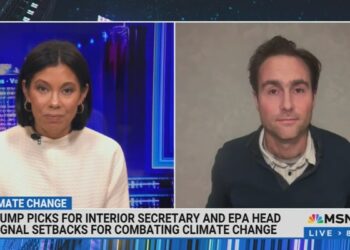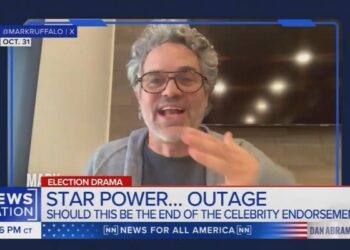MSNBC’s Ali Velshi took his trademark cowboy hat and Saturday show to Phoenix from where he interviewed PEN America CEO Suzanne Nossel about a Los Angeles Times op-ed she wrote entitled, How Elon Musk’s plans for Twitter could threaten free speech. Nossel warned that if Musk’s vision is ultimately realized, Twitter risks becoming the Tower of Babel.
Velshi asked, “Suzanne, Elon Musk’s whole point in his takeover for Twitter, or at least his whole stated point has been about free speech, has been about how social media and corporate America stifles free speech and he wants to bring free speech to Twitter, he calls it a digital town square. You are saying that in fact, the opposite might be achieved. Why?”
Nossel replied by treating Twitter as if it should be some sort of solemn debate room, “I can see its own risk. Look, free speech is not the Tower of Babel, it’s not an environment where everyone just sounds off at will and no one is listening to each other and it’s a cacophony.”
Twitter already was a cacophony before Musk took over, so blaming his ideal of free speech for that is misplaced and so was her own ideal of free speech, “Free speech, the value of free speech– the reason it’s protected under international law, under the First Amendment, is because it gives us the opportunity to persuade one another, to engage in a give and take, to reach an audience, to find better policies, to sort between fact and falsehood.”
Nossel isn’t totally wrong, so she should welcome Musk’s plan to allow users to share New York Post stories without problems. Interestingly, Nossel acknowledged the Post incident in her op-ed, but only to underwhelmingly note that it “raised questions.”
Yet, Nossel’s practical defense of free speech misses important things. Most people don’t believe what they do because they were convinced by wonky policy debates, but because they think it is morally correct. Which is why it was wrong for Twitter to impose its view of hate speech by suspending The Babylon Bee for a joke about Rachel Levine.
Again, somehow suggesting that “propaganda” isn’t a problem already on Twitter, Nossel continued, “And if you have a platform like Twitter that is so overrun with this disinformation that you cannot discern who to believe, that you are inundated with propaganda and people trying to pull one over on you, in that kind of environment, the value of free speech is undercut.”
Treating free speech once again as simply a practical tool, Nossel added, “You can’t learn about something new, you can’t spread your idea around, you can’t win new followers and so, I think that is the risk if he really goes through with what he originally said, which was that he was going to do away with all content guardrails. I think it would be that Tower of Babel environment.”
Some might say that MSNBC resembles the Tower of Babel. That does not mean that MSNBC should have its Twitter account suspended.
This segment was sponsored by Chase.
Here is a transcript for the October 29 show:
MSNBC Velshi
10/29/2022
8:25 AM ET
ALI VELSHI: Suzanne, Elon Musk’s whole point in his takeover for Twitter, or at least his whole stated point has been about free speech, has been about how social media and corporate America stifles free speech and he wants to bring free speech to Twitter, he calls it a digital town square. You are saying that in fact, the opposite might be achieved. Why?
SUZANNE NOSSEL: I can see its own risk. Look, free speech is not the Tower of Babel, it’s not an environment where everyone just sounds off at will and no one is listening to each other and it’s a cacophony. Free speech, the value of free speech– the reason it’s protected under international law, under the First Amendment, is because it gives us the opportunity to persuade one another, to engage in a give and take, to reach an audience, to find better policies, to sort between fact and falsehood.
And if you have a platform like Twitter that is so overrun with this disinformation that you cannot discern who to believe, that you are inundated with propaganda and people trying to pull one over on you, in that kind of environment, the value of free speech is undercut.
You can’t learn about something new, you can’t spread your idea around, you can’t win new followers and so, I think that is the risk if he really goes through with what he originally said, which was that he was going to do away with all content guardrails. I think it would be that Tower of Babel environment.
MSNBC’s Ali Velshi took his trademark cowboy hat and Saturday show to Phoenix from where he interviewed PEN America CEO Suzanne Nossel about a Los Angeles Times op-ed she wrote entitled, How Elon Musk’s plans for Twitter could threaten free speech. Nossel warned that if Musk’s vision is ultimately realized, Twitter risks becoming the Tower of Babel.
Velshi asked, “Suzanne, Elon Musk’s whole point in his takeover for Twitter, or at least his whole stated point has been about free speech, has been about how social media and corporate America stifles free speech and he wants to bring free speech to Twitter, he calls it a digital town square. You are saying that in fact, the opposite might be achieved. Why?”
Nossel replied by treating Twitter as if it should be some sort of solemn debate room, “I can see its own risk. Look, free speech is not the Tower of Babel, it’s not an environment where everyone just sounds off at will and no one is listening to each other and it’s a cacophony.”
Twitter already was a cacophony before Musk took over, so blaming his ideal of free speech for that is misplaced and so was her own ideal of free speech, “Free speech, the value of free speech– the reason it’s protected under international law, under the First Amendment, is because it gives us the opportunity to persuade one another, to engage in a give and take, to reach an audience, to find better policies, to sort between fact and falsehood.”
Nossel isn’t totally wrong, so she should welcome Musk’s plan to allow users to share New York Post stories without problems. Interestingly, Nossel acknowledged the Post incident in her op-ed, but only to underwhelmingly note that it “raised questions.”
Yet, Nossel’s practical defense of free speech misses important things. Most people don’t believe what they do because they were convinced by wonky policy debates, but because they think it is morally correct. Which is why it was wrong for Twitter to impose its view of hate speech by suspending The Babylon Bee for a joke about Rachel Levine.
Again, somehow suggesting that “propaganda” isn’t a problem already on Twitter, Nossel continued, “And if you have a platform like Twitter that is so overrun with this disinformation that you cannot discern who to believe, that you are inundated with propaganda and people trying to pull one over on you, in that kind of environment, the value of free speech is undercut.”
Treating free speech once again as simply a practical tool, Nossel added, “You can’t learn about something new, you can’t spread your idea around, you can’t win new followers and so, I think that is the risk if he really goes through with what he originally said, which was that he was going to do away with all content guardrails. I think it would be that Tower of Babel environment.”
Some might say that MSNBC resembles the Tower of Babel. That does not mean that MSNBC should have its Twitter account suspended.
This segment was sponsored by Chase.
Here is a transcript for the October 29 show:
MSNBC Velshi
10/29/2022
8:25 AM ET
ALI VELSHI: Suzanne, Elon Musk’s whole point in his takeover for Twitter, or at least his whole stated point has been about free speech, has been about how social media and corporate America stifles free speech and he wants to bring free speech to Twitter, he calls it a digital town square. You are saying that in fact, the opposite might be achieved. Why?
SUZANNE NOSSEL: I can see its own risk. Look, free speech is not the Tower of Babel, it’s not an environment where everyone just sounds off at will and no one is listening to each other and it’s a cacophony. Free speech, the value of free speech– the reason it’s protected under international law, under the First Amendment, is because it gives us the opportunity to persuade one another, to engage in a give and take, to reach an audience, to find better policies, to sort between fact and falsehood.
And if you have a platform like Twitter that is so overrun with this disinformation that you cannot discern who to believe, that you are inundated with propaganda and people trying to pull one over on you, in that kind of environment, the value of free speech is undercut.
You can’t learn about something new, you can’t spread your idea around, you can’t win new followers and so, I think that is the risk if he really goes through with what he originally said, which was that he was going to do away with all content guardrails. I think it would be that Tower of Babel environment.











